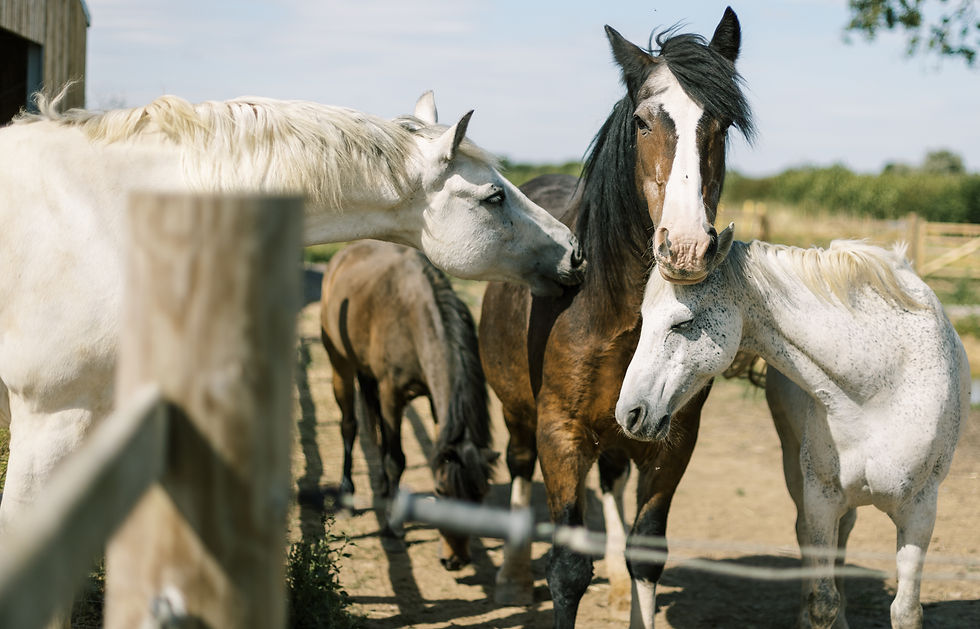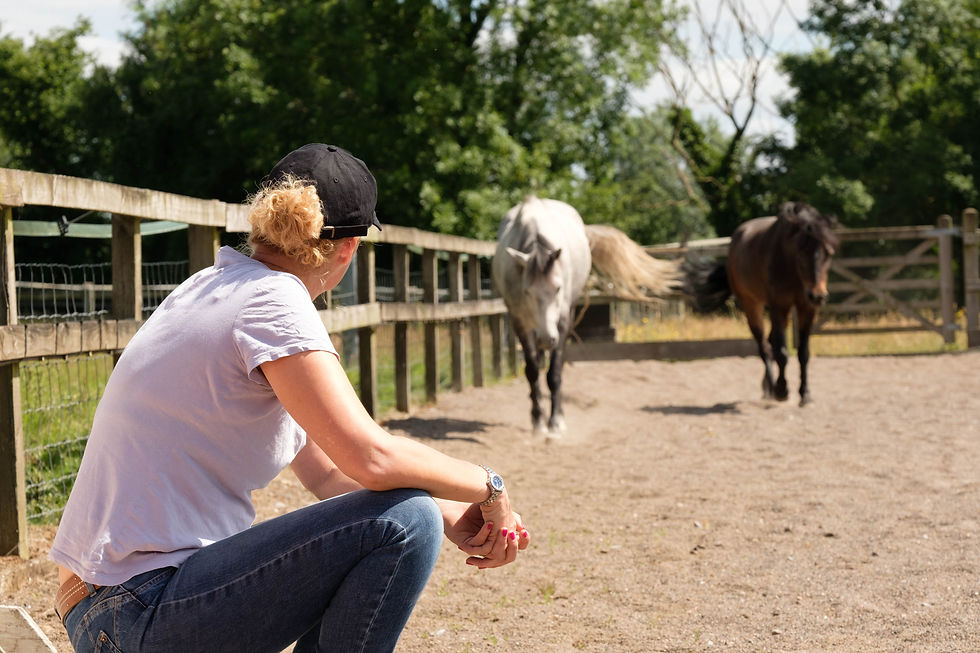Is Equine Therapy Right for You? 5 Signs It Could Help
- Nina Leijerstam
- Sep 23, 2025
- 4 min read
Updated: Sep 25, 2025
Equine therapy, sometimes called equine assisted therapy or horse therapy, is increasingly recognised in the UK as a powerful option for adults and children seeking emotional balance, trauma support, and nervous system regulation.

Equine therapy is a recognised therapeutic approach that supports nervous system regulation, emotional awareness, and relational healing. Horses are excellent co-regulators, responding directly to shifts in our nervous system and offering steady feedback that helps restore balance. They respond to what we feel rather than what we say, creating a non-judgemental space where both adults and children can safely explore new ways of being.
For some people, equine therapy becomes their main form of support. For others, it sits alongside talk therapy or other approaches, adding a powerful somatic dimension that can accelerate progress and bring hidden patterns into focus.
Whether you’re an adult navigating stress or a parent supporting a child with complex needs, here are five signs equine therapy could make a difference.
1. Overwhelm and Nervous System Dysregulation
If you often feel stuck in a heightened state — anxiety, panic attacks, hyper-vigilance in social situations, or difficulty calming after everyday stresses — your nervous system may be signalling for help. Horses, with their finely tuned herd awareness, naturally model regulation and help you practise moving from survival responses into safety and steadiness.

2. Exhaustion and Restless Sleep
A restless mind, long-term fatigue, or difficulty sleeping often reflects an over-stimulated nervous system. In equine therapy, the horses’ responses help bring awareness to the blocks and disruptions keeping the system on high alert. Working through these patterns with the herd not only supports release and rebalancing but also leaves the body in a more rested, restorative state.
3. Relationship Patterns and Boundaries
Finding yourself in repeated patterns — people-pleasing, struggling to honour your own needs, or difficulty holding boundaries — can leave you feeling disconnected from who you truly are. Horses reflect relational dynamics clearly and without judgement. This creates opportunities to practise authentic connection, presence, and boundaries in ways that are immediately felt, not just talked about.
Equine therapy is also especially supportive if trust in people has been shaken or social interaction feels overwhelming. Horses relate without pretence. They meet you exactly as you are, which is often the first step in rebuilding trust and safety.

4. Low Mood and Burnout
Fluctuations between low self-esteem, lack of motivation, or pushing yourself to the point of burnout are familiar to many. Horses notice these patterns and respond in ways that highlight them with clarity and compassion. Their feedback can help you recognise unhelpful cycles and begin to reorganise your energy with more balance. Many people leave sessions describing a sense of feeling lighter, more positive, and more grounded in themselves.
5. Trauma and Body Pain
Trauma is often held in the body long after the mind has tried to move on. Horses are exquisitely sensitive to these embodied states. They can attune to what is being carried, drawing awareness to places of tension or shutdown that may otherwise go unnoticed. For many people, this shows up as recurring headaches, chronic aches, or persistent pains that often take root in unresolved emotional disturbances. With this awareness, the process of release and transformation can begin, helping the nervous system move towards integration and safety.
Different Ways to Work with the Herd
Equine therapy can be experienced in different formats depending on your needs:
Individual therapy, for focused personal work
Parent–child pairs, for improved relationship dynamics
Family therapy, with siblings or family groups of up to five people
Group workshops, offering a collective experience of regulation and connection
Programmes are available as ongoing weekly sessions or in intensive 2-day or 2-week formats.

Why Children Respond So Well to Equine Therapy
Children often find it easier to engage with horses than with traditional therapy settings. The herd provides instantaneous feedback, allowing children to interact and learn naturally without feeling like they are “in therapy.” The approach is child-led, meaning everything that needs expressing can be expressed in relationship with the horses — free from the usual conventions of conversation.
This freedom, combined with the horses’ ability to attune and respond in the moment, makes equine therapy for children particularly effective for those living with autism, ADHD, anxiety, trauma, or sensory overwhelm. Sessions at Track Clinic are always supported by two experienced facilitators, bringing backgrounds in psychotherapy, trauma release, and somatic work. This ensures a safe, well-held space where both the child and the herd are carefully attuned to and supported.

Taking Your Next Step
If what you’ve read resonates, you’re welcome to arrange a free 20-minute consultation to talk through your situation, ask questions, and get a feel for whether equine therapy is right for you or your child. When you’re ready, you can get in touch here. You can also explore more about this work — from research and client stories to videos of the herd in action — on our Learn More page.
Track Clinic is based in Frome, Somerset, within easy reach of Bristol, Bath, Glastonbury, Salisbury, Yeovil, Trowbridge and Chippenham. We also welcome clients travelling from across the UK and internationally to attend programmes at our equine therapy centre.


